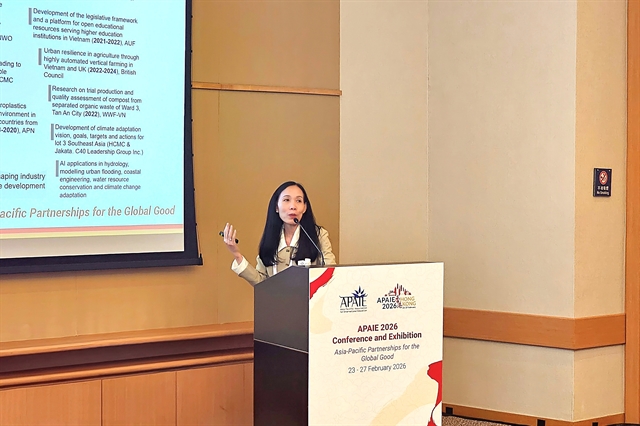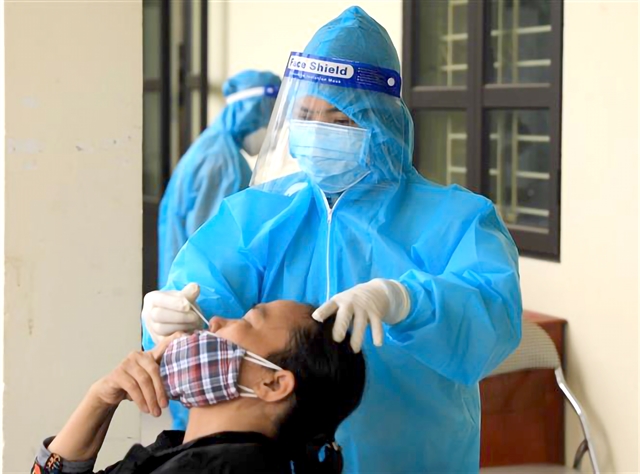 Society
Society

Việt Nam has been witnessing a sharp increase in the number of COVID-19 cases in recent months which is not only putting a strain on grassroots medical facilities, but also numerous businesses whose employees are infected with the virus.

|
| A medical worker takes a sample for testing from a resident in Thanh Trì District, Hà Nội, at the end of her treatment. — VNA/VNS Photo Hoàng Hiếu |
HÀ NỘI — Việt Nam has been witnessing a sharp increase in the number of COVID-19 cases in recent months which is not only putting a strain on grassroots medical facilities, but also numerous businesses whose employees are infected with the virus.
In Ô Chợ Dừa Ward, Đống Đa District, Hà Nội, medical workers are undergoing COVID while providing treatment at the same time.
Around 500 calls from patients coming in every day, calls which are answered by workers who are themselves infected and must sit in a separate room at the medical station – even though everyone on the team has already previously caught the virus.
The ward has detected COVID-19 infections in 27 out of 34 police officers, along with 12 other officials in its People’s Committee.
Lê Thu Hằng, one of the ward’s medical staff, said: “We have eight people on the team in total, but now all of them are infected.
“Some have small children, so they go home to be treated alongside their kids, but others stay at the medical station to continue working. To be honest, it is really difficult.
“I’m also infected but I can not go home. I stay here to work.”
In the face of such a huge workload, Ô Chợ Dừa People’s Committee and the police force have stepped in to help sort out patients’ medical records.
“All infected cases go through the fast response team, then the team leader will send the information to the ward’s medical staff.
“Then the processed paperwork is sent to the patients via mobile applications,” added Hằng.
Meanwhile, businesses are also short-staffed due to the surging COVID-19 caseload.
Lưu Thị Dung, deputy director of a food processing company in Triều Khúc Village (Thanh Trì District, Hà Nội) said her business of 500 employees has been supplying food for many industrial parks and restaurants.
However, with the recent outbreak, many of the staff have been infected with COVID, leading to a drastic change in their operations.
To address the workforce shortage, the management has had to transfer some of the accounting and administration staff to the production line.
“Lacking human resources, we also want to recruit more people but haven’t been able to do so, due to the huge outbreak in the community.
“We have had to resort to transferring staff from other departments, requiring our employees to implement the ‘three on-site’ model, to finish the tasks assigned and only return home at the weekend,” said Dung.
As of current, the company has registered over 100 COVID-19 cases, and the remaining 50 per cent of staff were close contacts of these infections.
These cases all need to be quarantined in accordance with the instructions of the health ministry.
In Bắc Giang Province, the number of cases in industrial parks has increased to several hundreds a day.
The province has taken multiple measures to address the situation, including administering booster vaccines and practising 5K measures in the workplace, as well as allowing businesses to decide their own testing frequency.
The locality is also connecting companies to job seekers through employment centres to address the human resources shortage.
According to doctor Trần Văn Phúc of Saint Paul Hospital, it is time to change our perspective on the pandemic.
He believed that if we are still stuck in the trap of the ‘COVID-19 pandemic’ when the Omicron variant is already running rampant, we will face a crisis of test kit supply shortage, human resources, and the healthcare system.
Dr Nguyễn Lân Hiếu, director of Hà Nội Medical University Hospital, also said that the rapid spread of the Omicron variant means that ‘zero COVID’ is impossible.
He added that it is time to consider COVID-19 one of the medical specialities, meaning that if a person is infected, they go to a specialised department for diagnosis and treatment.
In that spirit, we can stay calm and live with COVID, proactively resuming socio-economic activities to pre-pandemic levels, while comprehensively and effectively implementing safety measures, said Dr Hiếu. — VNS




